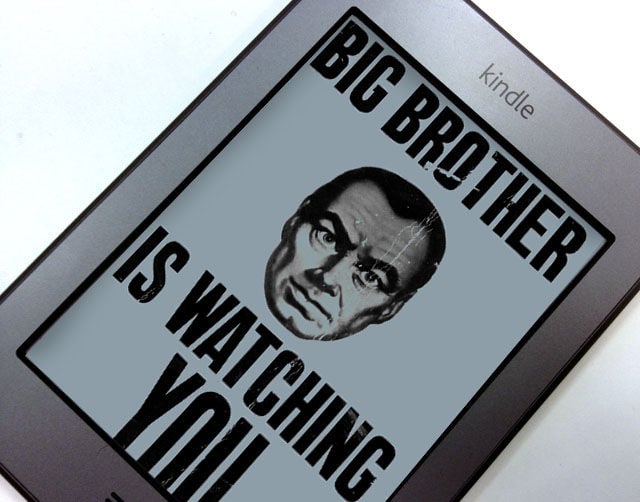This article is more than 1 year old
British bookworms deem Amazon 'evil'
Chuck away your e-reader - everyone else is
Something for the Weekend, Sir? “My only real prediction is that it’s all changing.”
Well, ask a stupid question - in this case, about the future of book publishing. The lobotomy-inducingly obvious answer was provided by author Neil Gaiman. If I’d written this prediction here on El Reg, I would have been derided as a time-waster specialising in stating the bleeding obvious. But because it’s famous Neil Gaiman, everyone nods and strokes their chins, muttering in adoration: “How wise”, “So true”, “What a mind”, “I hear he’s writing a 36th version of Neverwhere”, etc.
It only goes to show that we should stop expecting insightful comments from famous people just because they are celebrities. Some, such as Stirling Moss, should be forcibly prevented from answering the telephone, or locked away as they did with Margaret Thatcher in her final ‘Lady Gaga’ years. Or perhaps the problem lies in asking the wrong questions.
I’m reminded of a Spitting Image sketch mocking the late-1980s cult of yoof TV, in which a teenaged presenter is interviewing God: “Our viewers want to know the meaning of life and the universe!” God begins “Well, it’s...” but is immediately interrupted by the presenter: “Sorry, that was a question for Rick Astley. God, what our viewers want to know is: what are the colour of your socks?”

‘I’m the Almighty, and I’m here to tell you about a new kind of e-reader’
Source: Network home video
Gaiman was invited to share his effulgent wisdom during a keynote at the Digital Minds Conference, which opened this week’s London Book Fair. He also told authors and publishers that they were “on the frontier” in the digital age. No doubt some paradigms were shifted along the way. Oh lordy.
One of the London Book Fair’s highlights was the big debate - I was going to call it a bit of a ‘ding-dong’ but I don’t want to be censored by the BBC - about whether Amazon has a positive or negative influence on today’s book industry. On arriving, spectators were handed ballot slips for casting votes before and after the debate: we could choose between ‘Good’ and ‘Evil’.
It doesn’t take much insight to appreciate that the attitude of bookshops towards Amazon is similar to that of turkeys toward Yuletide. One of the speakers against the motion, Tim Godfray, chief executive of the UK Booksellers Association, inevitably and quite rightly focused on Amazon’s rigged - if currently legal - financial structure that ensured it paid little or no corporation tax and enjoyed a reduced VAT rate on ebook sales. Speaking in Amazon’s defence, Eoin Purcell, editor of New Island Books and Irish Publishing News, insisted that bookshops should stop whining just because Amazon is successful. One assumes this means every village bookshop ought to establish a head office in Luxembourg with no staff but massive expenses and route all their digital products through Ireland.
If I might be permitted to make my own suggestions, I think bookshops should also install sofas and coffee machines, and invent a process for ordering out-of-stock titles that doesn’t involve queueing for half an hour to speak to a 17-year-old fuckwit who can’t spell or use a mouse. I have spent less time waiting at a DIY store Customer Services counter.
And don’t employ Daisy from Spaced.

‘I'm sorry... was it a book you were after?’
Source: Channel 4 DVD
More interesting were the secondary speakers, deliberately chosen for their tech-head backgrounds. Jennifer Lee of Plympton and publisher of Daily Lit reminded us that Amazon’s heavily subsidised Kindle hardware pushed ebooks into the mainstream where the likes of Sony failed miserably - surely itself a massively progressive influence on the book publishing industry. Personally, I would go further: the early Kindles smoothed the path for all tablet computers. Very significantly, but largely ignored by the audience, Lee also pointed out that Amazon’s greyscale e-readers are “in a transitional stage” and would soon give way to competition from a wider range of tablet vendors.
This is not what the London Book Fair wanted to hear and the spectators duly pretended not to, but the signs are already clear. Despite a big presence by Kobo on the exhibition floor, keen to show off its Aura HD, there were precious few new e-readers on show. Contrast this with just a year ago when the same exhibition was awash with prototypes from Germany and China.
Lee’s view was coincidentally backed the following day by Markus Gylling of the International Digital Publishing Forum, the organisation that co-ordinates the development of the ePub format. Answering questions at the end of his seminar on the next round of ePub enhancements, Gylling said that he thought Amazon’s Kindle lock-in approach to ebook sales will loosen over the next year or so simply because the ebook market will shuffle away from dedicated e-readers in favour of multifunctional colour-screen tablets and smartphones.

Effectively, the device now determines the product, which is a curious inversion of the time-honoured approach to IT purchases. If someone walks into a computer shop and wants to know which computer to buy, the assistant will ask what they want to do with it. With tablets, the whole process is reversed: consumers buy a tablet based on how shiny they look in adverts and on what they can afford, and only when they get back home and take it out of the box do they seriously consider what software they should run on it.
In other words, one of Amazon’s two master weapons in market dominance – device lock-in – is destined for landfill. The other – low prices achieved through legal but immoral financial shenanigans – could become a public-relations burden. Already, people tell me they deliberately avoid Starbucks for this reason alone, and the cost saving for readers who buy ebooks from Amazon rather than from other ebook vendors is just pennies after all.
“None of these companies is evil,” Free Ride’ author Rob Levine told booksellers and publishers at the end of the Amazon debate. “It’s just that their interests do not align with yours. You want to sell books for money – Amazon wants to prep up a platform.”
There it is again: the future of publishing success relies on getting the IT side right, which is something Amazon does extremely well. Neil Gaiman is right, damn him. ®
 Alistair Dabbs is a freelance technology tart, juggling IT journalism, editorial training and digital publishing. He is pleased to announce the results of the voting. Before the debate, the audience voted 51 per cent to 49 per cent in favour of Amazon having a positive influence on the book industry. After the debate, opinion swung the other way, with 42 per cent voting for Amazon while 58 per cent posted the slips marked ‘Evil’.
Alistair Dabbs is a freelance technology tart, juggling IT journalism, editorial training and digital publishing. He is pleased to announce the results of the voting. Before the debate, the audience voted 51 per cent to 49 per cent in favour of Amazon having a positive influence on the book industry. After the debate, opinion swung the other way, with 42 per cent voting for Amazon while 58 per cent posted the slips marked ‘Evil’.
